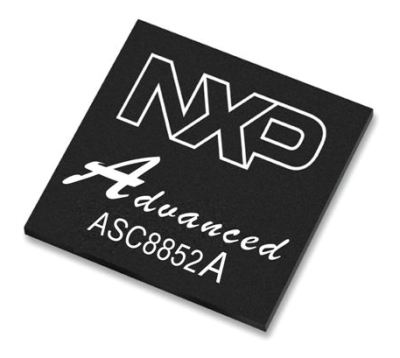In a breakthrough for high-definition (HD) network video surveillance, NXP Semiconductors N.V. today announced its Advanced ASC884xA and ASC885xA series of single-chip video processors for HD IP security cameras. These devices integrate virtually all functions required for an IP camera design -- from raw image sensor data input, image signal processing (ISP), and H.264 compression, to secure encrypted transmission over the network through a Gigabit Ethernet interface.
 NXP Advanced ASC884xA and ASC885xA series for IP cameras
NXP Advanced ASC884xA and ASC885xA series for IP cameras
Capturing as many as 60 frames per second at Full HD resolution (1080p/60), the new Advanced series supports H.264 High Profile encoding while consuming less than 1.5 W of power, achieving the best power efficiency and lowest bit rate compared to other solutions on the market today. Further, the ASC884xA and ASC885xA devices enable extremely clear video images through advanced ISP features such as very flexible spatial and temporal (2D/3D) noise reduction for excellent low-light performance -- critical for security cameras operating under a wide range of lighting conditions -- as well as programmable edge enhancement. NXP is showcasing the ASC884xA and ASC885xA series along with other solutions for the "Internet of Things" (IoT) this week at Security China 2012 in Beijing (Hall E1, H45), and a demonstration can be viewed here: https://youtu.be/RLTymPP5bag
According to IMS Research (now part of IHS), 2014 will be the tipping point when sales of network video surveillance equipment worldwide overtake analog video surveillance equipment sales. The benefits of HD IP cameras are significant. In addition to being able to access real-time video from anywhere in the world securely over the Internet, they enable higher-quality surveillance; recognition of faces, license plates and other identifying features; improved security; and require fewer cameras to be deployed. At the same time, the market shift to HD video surveillance has opened up new technical challenges in image signal processing, as most high-resolution image sensors introduce more noise and have lower light sensitivity. Compression of data for transmission over the IP network has presented similar challenges, forcing camera makers to compromise either picture quality, bit rate or power efficiency.
"With our new Advanced series of video processors, HD IP camera makers and OEMs no longer have to settle for poor-quality pictures -- or settle for power-hungry chips that run so hot they burn to the touch," said Rick Dumont, global marketing director for IP camera products at NXP Semiconductors. "The Advanced Series is taking networked video surveillance to the next level, enabling stunningly clear HD motion-picture images -- even indoors and at night -- as well as H.264 High Profile compression at the lowest bit rates to reduce network load and hard disk video storage space. The total savings in terms of bill of materials, power consumption, video storage, and cost of ownership are tremendous. Our customers are also excited about the wealth of possibilities this opens for new, more sophisticated Internet, Wi-Fi and video conferencing cameras in the smart home, in access management, and in professional video security and surveillance."
While professional IP cameras today typically offer 2 megapixel resolution, NXP's Advanced series HD IP camera product can support as much as 12 MP of raw image sensor data input, with flexibility of SVC and ROI encoding, and the ability to encode 5 MP resolution video at 25 frames per second or any sensor resolution in between. The feature-rich image processing pipeline has very flexible 3D noise reduction options, as well as edge enhancement and motion adaptive de-interlacing.
The ASC8852A also delivers the best video compression quality available today, with H.264 High Profile support at 60 frames per second, at a bit rate of less than 5 Mbit/sec under standard lighting conditions, and less than 1 Mbit/sec for extreme 3D noise reduction modes in low light conditions. In addition to the ASC8852A flagship product for 1080p/60 performance, NXP is releasing a complete range of pin-compatible Advanced ICs down to1080p/30 (ASC8850A) and even 720p/30 (ASC8848A), all of which exhibit the same unrivalled image processing quality, low power consumption and low bit rate. The ASC8848A offers an H.264-encoded bit rate of less than 500 kbit/s at a power consumption level close to 0.5 W.
Availability
Pricing is available upon request. Evaluation samples of the ASC8848A, ASC8849A, ASC8850A, ASC8851A and ASC8852A will be available to lead customers starting in Q1 2013, with volume manufacturing starting in Q2 2013.